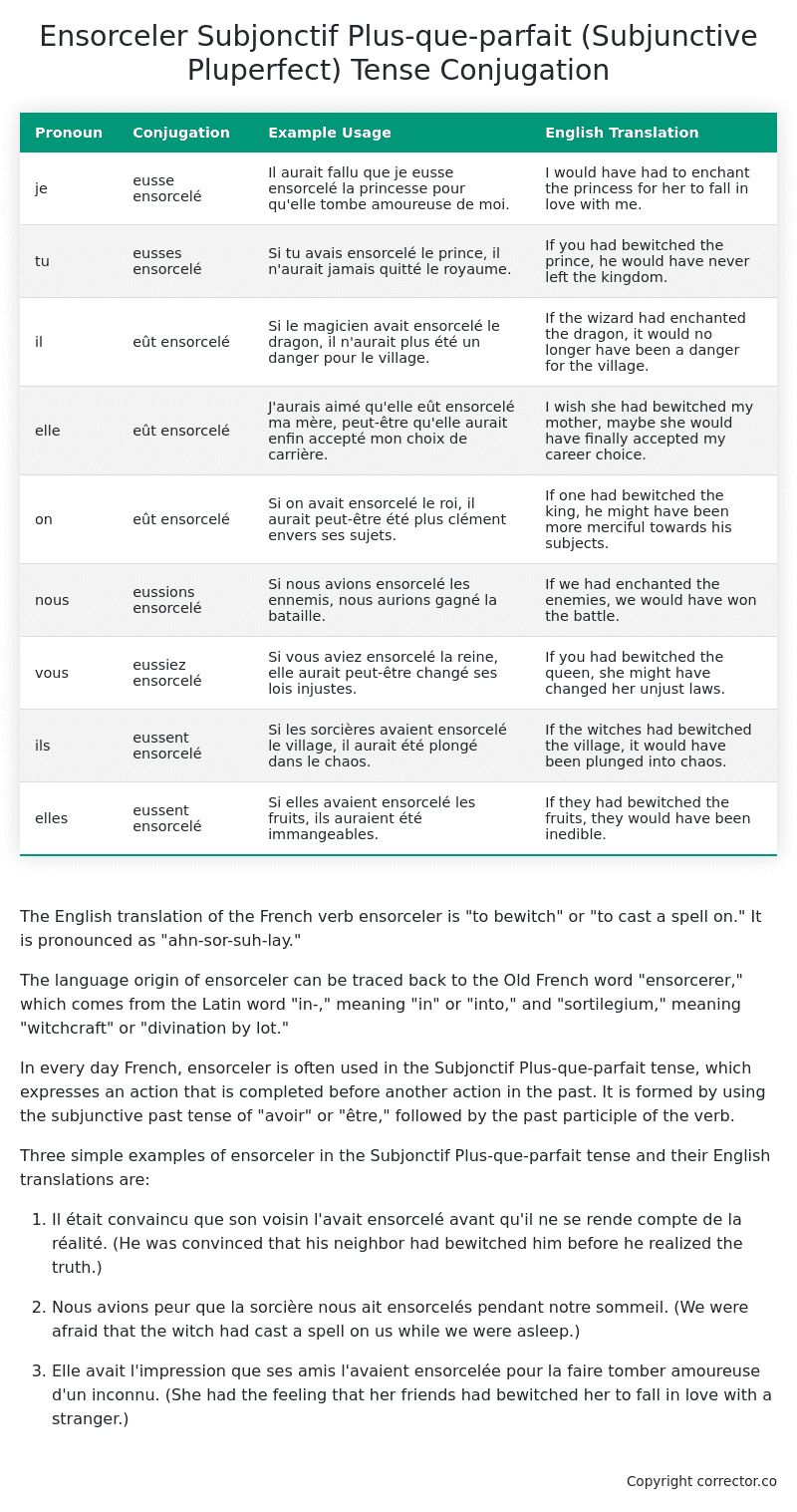Subjonctif Plus-que-parfait (Subjunctive Pluperfect) Tense Conjugation of the French Verb ensorceler
Introduction to the verb ensorceler
The English translation of the French verb ensorceler is “to bewitch” or “to cast a spell on.” It is pronounced as “ahn-sor-suh-lay.”
The language origin of ensorceler can be traced back to the Old French word “ensorcerer,” which comes from the Latin word “in-,” meaning “in” or “into,” and “sortilegium,” meaning “witchcraft” or “divination by lot.”
In every day French, ensorceler is often used in the Subjonctif Plus-que-parfait tense, which expresses an action that is completed before another action in the past. It is formed by using the subjunctive past tense of “avoir” or “être,” followed by the past participle of the verb.
Three simple examples of ensorceler in the Subjonctif Plus-que-parfait tense and their English translations are:
-
Il était convaincu que son voisin l’avait ensorcelé avant qu’il ne se rende compte de la réalité. (He was convinced that his neighbor had bewitched him before he realized the truth.)
-
Nous avions peur que la sorcière nous ait ensorcelés pendant notre sommeil. (We were afraid that the witch had cast a spell on us while we were asleep.)
-
Elle avait l’impression que ses amis l’avaient ensorcelée pour la faire tomber amoureuse d’un inconnu. (She had the feeling that her friends had bewitched her to fall in love with a stranger.)
Table of the Subjonctif Plus-que-parfait (Subjunctive Pluperfect) Tense Conjugation of ensorceler
| Pronoun | Conjugation | Example Usage | English Translation |
|---|---|---|---|
| je | eusse ensorcelé | Il aurait fallu que je eusse ensorcelé la princesse pour qu’elle tombe amoureuse de moi. | I would have had to enchant the princess for her to fall in love with me. |
| tu | eusses ensorcelé | Si tu avais ensorcelé le prince, il n’aurait jamais quitté le royaume. | If you had bewitched the prince, he would have never left the kingdom. |
| il | eût ensorcelé | Si le magicien avait ensorcelé le dragon, il n’aurait plus été un danger pour le village. | If the wizard had enchanted the dragon, it would no longer have been a danger for the village. |
| elle | eût ensorcelé | J’aurais aimé qu’elle eût ensorcelé ma mère, peut-être qu’elle aurait enfin accepté mon choix de carrière. | I wish she had bewitched my mother, maybe she would have finally accepted my career choice. |
| on | eût ensorcelé | Si on avait ensorcelé le roi, il aurait peut-être été plus clément envers ses sujets. | If one had bewitched the king, he might have been more merciful towards his subjects. |
| nous | eussions ensorcelé | Si nous avions ensorcelé les ennemis, nous aurions gagné la bataille. | If we had enchanted the enemies, we would have won the battle. |
| vous | eussiez ensorcelé | Si vous aviez ensorcelé la reine, elle aurait peut-être changé ses lois injustes. | If you had bewitched the queen, she might have changed her unjust laws. |
| ils | eussent ensorcelé | Si les sorcières avaient ensorcelé le village, il aurait été plongé dans le chaos. | If the witches had bewitched the village, it would have been plunged into chaos. |
| elles | eussent ensorcelé | Si elles avaient ensorcelé les fruits, ils auraient été immangeables. | If they had bewitched the fruits, they would have been inedible. |
Other Conjugations for Ensorceler.
Le Present (Present Tense) Conjugation of the French Verb ensorceler
Imparfait (Imperfect) Tense Conjugation of the French Verb ensorceler
Passé Simple (Simple Past) Tense Conjugation of the French Verb ensorceler
Passé Composé (Present Perfect) Tense Conjugation of the French Verb ensorceler
Futur Simple (Simple Future) Tense Conjugation of the French Verb ensorceler
Futur Proche (Near Future) Tense Conjugation of the French Verb ensorceler
Plus-que-parfait (Pluperfect) Tense Conjugation of the French Verb ensorceler
Passé Antérieur (Past Anterior) Tense Conjugation of the French Verb ensorceler
Futur Antérieur (Future Anterior) Tense Conjugation of the French Verb ensorceler
Subjonctif Présent (Subjunctive Present) Tense Conjugation of the French Verb ensorceler
Subjonctif Passé (Subjunctive Past) Tense Conjugation of the French Verb ensorceler
Subjonctif Imparfait (Subjunctive Imperfect) Tense Conjugation of the French Verb ensorceler
Subjonctif Plus-que-parfait (Subjunctive Pluperfect) Tense Conjugation of the French Verb ensorceler
Conditionnel Présent (Conditional Present) Tense Conjugation of the French Verb ensorceler
Conditionnel Passé (Conditional Past) Tense Conjugation of the French Verb ensorceler
L’impératif Présent (Imperative Present) Tense Conjugation of the French Verb ensorceler
L’infinitif Présent (Infinitive Present) Tense Conjugation of the French Verb ensorceler
(this article)
Struggling with French verbs or the language in general? Why not use our free French Grammar Checker – no registration required!
Get a FREE Download Study Sheet of this Conjugation 🔥
Simply right click the image below, click “save image” and get your free reference for the ensorceler Subjonctif Plus-que-parfait tense conjugation!

Ensorceler – About the French Subjonctif Plus-que-parfait (Subjunctive Pluperfect) Tense
Formation
Common Everyday Usage Patterns
Hypothetical Situations
Reported Speech
Doubt, Wishes, and Emotions
Interactions with Other Tenses
Present Subjunctive
Imperfect Subjunctive
Conditional
Summary
I hope you enjoyed this article on the verb ensorceler. Still in a learning mood? Check out another TOTALLY random French verb conjugation!


